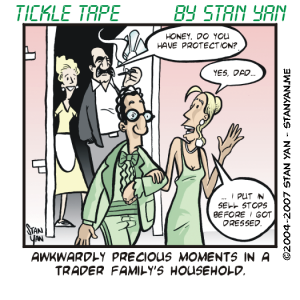When your money is on the line, there’s a natural inclination to desire complete control. You want perfect information and guarantees that every trade you execute will be a winner. Humans are risk-averse and most people want a sure profit. The masses would gladly take a small profit upfront than gamble on a bigger win in the future. But trading is not about playing it completely safe.
The short-term trader is willing to take a risk with the goal of making a big profit. How is it done? Trading requires that you work with imperfect data, and try to work around a market that is unpredictable. The markets are often chaotic. No one really knows what will happen next. The astute trader is aware of this uncertainty and takes steps to prevent it from adversely influencing trading decisions. The winning trader is the trader who knows how to cope with uncertainty.
Some traders feel uneasy when they are uncertain. Uncertainty is scary. It’s reasonable to feel a little afraid when you aren’t sure what will happen next. It is a form of protection. We instinctively want to maintain control. The more we can master our environment, the safer we will be. This natural inclination extends to trading. We often want to control the markets, but we know deep down that the best we can do is to work with them and accept what the markets offer us. We can’t control the markets any more than we can control the weather.
Many people try to cope with uncertainty by pretending that they have more control than they actually have. They live under the illusion that they can control the markets. But it is vital that you admit that the markets are uncertain, and if it bothers you, it is essential that you admit it. Don’t hide from your feelings of uneasiness. Some people were taught as children to hide their fear and other emotions, to put up a courageous front in the face of adversity. But trying to hide your emotions often makes them even more difficult to control. It’s better to just admit that you are afraid, and admit that the markets are uncertain.
You don’t know what the outcomes will be, and thus, there is a good chance that you will lose money on some of your trades. You’ll find that once you admit the possibility of loss, you’ll feel much better, and gain control more easily. Although the markets are uncertain, it doesn’t mean that you won’t profit if you control your risk, and trade with sound methods. Think of the big picture. You may not know the outcome on any one trade, but across a series of trades, you’ll come out profitable if you use trading methods that put the odds in your favour.
Perhaps the most important way to cope with uncertainty is to know your personality. People differ in terms of how they can deal with uncertainty and the fear and uneasiness associated with it. Some people are easily frightened while others can stay calm under the most chaotic circumstances. It’s important to know where you stand on the fear-tolerance continuum. If your tolerance for fear and chaos is low, it’s going to be harder to gain control compared to others, and you’ll do yourself a disservice by acting as if you do not have a problem with gaining mastery. For some, it may be necessary to adjust one’s trading strategy.
If one has difficulty trading in a fast-paced chaotic environment, for example, it may be necessary to make only long-term investments, where quick decisions are less urgent. Or when trading in the shorter term, it may be useful to use the automatic settings on your trading software to exit or place specific orders with a broker over the phone. Regardless of the strategy you try, it’s vital to gauge your tolerance for uncertainty and take appropriate steps to compensate. Coping with the uncertainty of the markets is vital for enduring success in the markets. The more you can accept uncertainty and find some way to deal with it, the more profits you’ll realize.


